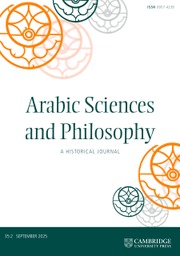WHEN THE PRESENT MISUNDERSTANDS THE PAST HOW A MODERN ARAB INTELLECTUAL RECLAIMED HIS OWN HERITAGE
Published online by Cambridge University Press: 09 May 2018
Abstract
The beginning of the 20th century has witnessed a significant development that has renewed and stimulated the long passionate historical relationship between two great civilisations which are traditionally known as the West and the East. Following their ancestors who cultivated the quest for knowledge tradition, some Arab scholars have come to leading European countries to learn the latest advancement in knowledge. They did not expect they would be confronted with what seems to be the poor showing of their scientific and cultural heritage according to the assessment that was carried out in the previous century by Western scholars and historians. The Western study of the Eastern heritage had such influence that it has generated new Arab intellectual elite which blames the past for the present difficulties. Following the discovery of major scientific Arabic works in the second half of the 20th century, some Arab scholars like Ibrahim Madkour realised that they had in fact just misunderstood their own tradition. What is the source of their misunderstanding? How did they become aware of it? And how can a better understanding of the past change present attitudes and guide future actions? By attempting to provide some answers to such questions, the aim of this paper is to shed light on what seems to be a turning point in modern Arabic intellectual history.
Résumé
Le début du XXe siècle a connu un développement important qui a renouvelé et stimulé la longue relation historique passionnelle entre deux grandes civilisations traditionnellement connues sous le nom d'Occident et d'Orient. Suivant leurs ancêtres qui ont cultivé la tradition de la quête du savoir, plusieurs chercheurs arabes sont venus dans les grands pays européens pour apprendre les dernières avancées scientifiques. Ils ne s'attendaient pas à être confrontés par ce qui semble être la performance médiocre de leur patrimoine scientifique et culturel selon l’évaluation réalisée par les érudits et historiens occidentaux au siècle précédent. L’étude occidentale du patrimoine oriental a eu une telle influence qu'elle a fini par donner lieu à l’émergence d'une nouvelle élite intellectuelle arabe qui blâme le passé pour les difficultés présentes. Suite à la découverte des travaux scientifiques majeurs arabes durant la seconde moitié du XXe siècle, certains intellectuels arabes comme Ibrahim Madkour se sont rendus compte qu'ils avaient en fait mal compris leur propre tradition. Quelle est la source de leur incompréhension? Comment en ont-ils pris conscience? Et comment une meilleure compréhension du passé peut-elle changer l'attitude présente et guider l'action future? En essayant de fournir des éléments de réponse à de telles questions, le but de cet article est de faire la lumière sur ce qui semble être un tournant dans l'histoire intellectuelle arabe moderne.
- Type
- Research Article
- Information
- Copyright
- Copyright © Cambridge University Press 2018
Footnotes
“A traditionalist is he who follows a tradition without proof.” (Abū al-Walīd al-Bājī, Kitāb al-Minhāj fī tartīb al-ḥijāj, ed. A. Turki [Paris, 1978], p. 13.)
In R. Morelon and A. Hasnawi (eds.), De Zénon d’Élée à Poincaré. Recueil d’études en hommage à Roshdi Rashed (Leuven, 2004), p. XX.
- 2
- Cited by




